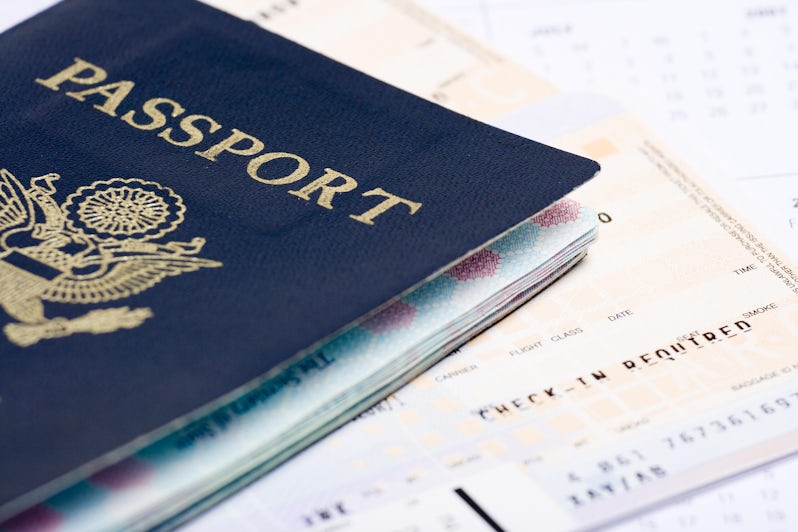
9 Things You Should Never Try to Hide from a Cruise Line


For some reason, some cruise ship passengers assume that rules don't apply to them. That's probably why we see babies bobbing in hot tubs, chair hogs leaving their towels on loungers for hours at a time and people cutting in line at the bar. Cruisers also attempt to board the ship with all kinds of prohibited items, like surge protectors, curling irons and candles.
But some regulations are health- and safety-focused, strictly enforced and therefore not to be messed with. Here are nine things you should never try to hide from a cruise line.
On This Page
1. Your Pregnancy
We get it: You desperately want to enjoy a babymoon -- one last romantic, kid-free vacation -- before you give birth. And as long as your physician has cleared you for travel, you're free to do so. Just be aware that industry regulations regarding sailing while pregnant are there for a reason -- your health and safety -- so it's best to heed them.
Most ocean cruise lines accept passengers that are less than 24 weeks into their pregnancies. If you're one of those lucky moms-to-be that barely have a baby bump, don't try to sneak onboard if you're further along than that. Should you have complications or go into early labor, cruise ship medical facilities are not equipped to help you nor a premature newborn baby.
Some river cruise lines, however, won't stop you from sailing beyond 24 weeks because they generally travel closer to land-based medical facilities. Do your homework before you plan your cruise.
Can I Cruise While Pregnant? What You Need to Know

2. A Contagious Medical Issue
Even if you try and hide the fact you've got a dry continuous cough and have lost your sense of smell and taste -- you're going to be subject to a pre-boarding PCR test -- so be warned.
Cruise lines insist that passengers sign declarations attesting they are medically and physically fit for travel, and we ask that you don't lie. Boarding a ship with thousands of passengers when you're contagious with coronavirus, Norovirus or any other virus is never a good idea because germs can spread quickly in a self-contained environment with communal dining and recreational facilities, as we have become only too aware in the past year or so. You don't want to be the Typhoid Mary who ruins the vacations of scores of other travelers.
Many lines have long stipulated that not disclosing a contagious illness violates the passenger conduct policy, which you agreed to adhere to when you purchased the cruise -- and expect more stringent rule adherence cruising in the age of COVID.
So 'fess up. The ship's medical team, which has the authority to prevent you from boarding if it puts other passengers' well-being at risk, will evaluate you. And as long as you are not found to be gravely ill with a high fever and, shall we say, very active tummy issues, chances are they'll simply ask you to stay in your cabin until you are no longer contagious -- typically 72 hours.
By the way, this is another reason why you should always have travel insurance in place: Should you be turned away upon embarkation due to illness, your trip's coverage means you won't be out the price of your vacation.
3. Contraband Alcohol
Sure, buying drinks can cost a hefty sum on a cruise, and that's why many passengers figure they'll sneak some onboard to save big bucks. We've heard of people decanting booze into mouthwash bottles and specially designed plastic bags, but cruise lines have seen every possible hiding spot, and they will most likely sniff out whatever you're trying to hide. And if they find your contraband, they will take it and might not give it back.
Consider going by the book: Bring the one bottle of wine per person that is allowed, and spring for a drinks package (which can save enthusiastic drinkers some coin).
How to Sneak Alcohol on a Cruise: A Hypothetical (and Highly Discouraged) Approach

4. Food Allergies
Food allergies are increasingly common, and in many cases, they can be severe enough to trigger a life-threatening episode. That's why it's important to let a cruise line know in advance which ingredients can make you ill. In fact, any special dietary requirements -- either for health or religious reasons -- and food sensitivities should be disclosed because cruise lines can accommodate just about anything within reason, as long as you give them notice.
For example, Azamara suggests that passengers get in touch at least two months before sailing, so that the ship's chefs can purchase any additional ingredients needed for special meals. At the very least, go see the ship's restaurant manager or executive chef as soon as you board to discuss your needs. You will feel more comfortable and eat better if you do.
Tips for Cruising With a Dietary Restriction -- and Eating Well
5. Weapons
Cruise ship security regulations strictly prohibit weapons onboard, so even if you have a permit, leave your firearm and ammo behind, unless you want to face legal penalties. Ditto for knives, so forget toting your 20-piece Swiss Army multitool. Many lines also prohibit any sharp objects, such as scissors with blades longer than 4 inches.
Cruise terminal scanners will definitely see if you've packed Mace or other pepper sprays, and confiscate them, so if you must have a self-defense plan in place, stick to common sense rules like sticking together with friends and not going into strangers' cabins, or bring a safety whistle.
What Not to Pack: Things You Want to Bring on a Cruise But Shouldn't

6. Children's Special Needs
Many parents look forward to signing their brood up at the kids club so they can spend a few blissful hours at the thermal spa or another adults-only oasis. But don't just dump and run, especially if your child has special needs or behavioral issues that cruise ship staff need to know about.
For example, if your kid is on the autism spectrum but is high-functioning, don't assume every program will be suitable. Some cruise lines, such as Royal Caribbean, offer autism-friendly options, including films, toys and products, plus staff that have been specially trained. Carnival also has youth programs for children with disabilities, and the cruise line suggests meeting with Guest Services upon embarkation to learn more.
7. Your Expiring Passport
If you plan to use your passport as ID for your next cruise, be aware that while some countries in Europe require that your document is valid for three months after the planned date of departure from that country, most countries require a six-month validity. Don't expect to sneak that past a customs official.
Not planning to bring your passport at all? Keep in mind that if, for any reason, you need to fly out from a port in case of emergency or if you miss the ship's departure, you will need a valid passport. So double-check your documents, and consider renewing an older passport and bringing the new one with you … just in case.
Do You Need a Passport to Go On a Cruise?

8. Your Caregiver's Immigration Status
Some families prefer traveling with a hired caregiver -- whether it's a nanny or au pair for the kiddos, or someone to assist a wheelchair-using grandma. But did you know that cruise lines must enforce the entry requirements of each country and port of call, based on that person's country of citizenship?
So, for example, if your nanny is from Nepal and you're booked on a Mediterranean cruise that docks in Croatia, she may be denied boarding in accordance with Croatian immigration regulations, unless a special visa was issued. Best to be upfront while booking: Who will be traveling with you? Where are they from and do they need specific documentation?
Cruise Rules and Regulations, Plus Travel Documents and Information
9. Your Enthusiasm
Most people cruise because they want to have a fantastic experience at sea. So don't be afraid to smile, get a little silly and engage with other passengers and crew. Everyone appreciates fellow cruisers who are happily enjoying themselves, so take advantage of all the ship has to offer. Practice excellent cruise etiquette: Say thank you often, treat the crew members with respect and be friendly. Above all, never keep your joy and excitement to yourself. It's contagious -- but in the best way possible.
How Not to Be Rude on a Cruise: 10 Ways to Make the Crew Love You